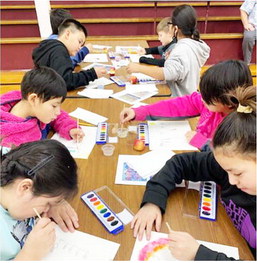HEART Program Improves Third-Grade Students


A new program for Wolf Point’s elementary students aims to improve and maintain the student’s attitude toward education both now and in coming years.
HEART, which stands for Healing Through Education and Art for Resiliency Teaching, is being instructed implemented by educators Dr. Julie Alexander-Ruff and Dr. William Ruff from Montana State University - Bozeman. Julie is a professor in the College of Nursing and William (Bill) is a professor in the College of Education.
Last year, Julie Ruff led the Art for Wellness for fourth and fifth grade students in Wolf Point. After receiving support from tribal officials, school administrators asked her to work with third-grade students this school year.
“We wanted to start there before a lack of interest occurs, 8-year olds are curious and excited about learning,” Ruff explained. Let’s keep that excitement as students matriculate through the school system.”
Once a month, she has led the third-grade students in art and wellness projects. Topics so far this school year have included themselves, their school, their classroom and their family. Next, they will focus be on community and culture.
She noted a goal includes to teach students mindfulness so they can more easily calm themselves down during stressful situations.
An art show is planned near the end of the school year to celebrate the children’s work. “We’re reinforcing the students value. That’s what I hope,” Julie Alexander-Ruff said. “We’re reinforcing their modeling that they are doing beautiful things like sharing and trying new things. They are working hard and are proud of their work.” In turn, the children are informing us on their perceptions of subjective well being.
The project isn’t costing anything for the Wolf Point School District. Expenses are being taken care of through donations of art supplies and grants.
The instruction includes a nutrition component is being provided with assistance from of Martin Smith, who works as a nutritionist for the Fort Peck Tribes’ Health Promotion Disease Prevention program. The healthy snacks usually are something unique that students don’t encounter every day. Students learn how to calm any feelings of frustration through mindfulness and deep breathing. This method is known to decrease children’s perceptions of illness, such as headache and tummy ache related to stressful situations rather than to illness.
Surveys are being conducted with children, who received parental consent, to measure the impact of this project on the children’s perceptions of their wellbeing. Survey questions include how do you feel about school, what are you good at? What makes you feel good? The surveys will be reviewed and reported to the community at the end of the school year.
“So far, the children They show in their art that they are really happy and that culture and family means a lot to them,” Julie Ruff said.
Bill Ruff, meanwhile, is meeting directly with teachers. He observes classrooms and studies concentrating on teacher/student relationships. Afterwards, he holds discussions what he saw with the instructors.
“For 20 years, we have been focusing on test scores, attaining limited results” Bill Ruff said. “Now, we need to make see and know our students as individuals and understand their individual strengths. By engaging the children’s individuality and natural curiosity, they will become their best selves ” The plan is to continue to work with the current third-graders throughout their education courses they move through elementary school and with as well as begin again with next year’s third-grade students.
“My personal aim is to increase each child’s health and well-being as decrease student’s absenteeism and that we build resiliency,” Julie Alexander- Ruff said.


